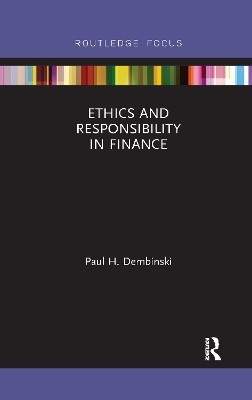
Ethics and Responsibility in Finance
Routledge (Verlag)
978-0-367-60743-2 (ISBN)
From the mid-1970s until the crisis in 2007, the world of finance enjoyed thirty euphoric years as the general public, businesses and governments put their blind trust in financial techniques, professions and institutions. Shaken up by a structural crisis and a crisis of legitimacy, today’s financial sector can no longer afford to avoid the issues summed up by the key question: what is next for the role of ethics and responsibility in finance? Many see an unbridgeable gap between ethics and responsibility and financial practice. Ethics and Responsibility in Finance paves the way for the dialogue that is needed in order to solve the current problems and allow the return of a refined ethical thinking in the financial sector.
This book opens with an in-depth analysis of the operational implications of two key notions: ethics and responsibility. It then addresses ethical dilemmas that are characteristic to each of the three actors involved in any financial transaction. This begins with the discussion of the dilemmas of the ultimate owner of funds: the individual or collective saver, as in the case of pension funds. The analysis then turns to financial intermediaries such as banks, insurance companies, asset managers, and consultants, who work in a web of different loyalties. Finally, the dilemmas of the user of funds are addressed – the household taking a mortgage, an enterprise or a public authority which borrows – all of which have to be clear on the reasons and values driving their decisions.
This volume is of great interest to those who study banking, corporate finance and ethics philosophy.
Paul H. Dembinski holds the Chair of International Strategy and Competition at Switzerland’s University of Fribourg. He has a doctorate in political economy (1982) from the University of Geneva, where he began his teaching career, later (1991) becoming a tenured associate professor at the University of Fribourg. In 1996 he launched the Observatoire de la Finance Foundation in Geneva (www.obsfin.ch) with the aim of encouraging the financial sector to take more account of the common good. He is still its director, and is chair of the international ‘Ethics & Trust in Finance Prize’, which will be awarded for the sixth time in 2017. He also edits the bilingual journal Finance & the Common Good/Finance & Bien Commun. Paul H. Dembinski is on the board of directors of Rentes Genevoises (public annuity company), which he has chaired since 2012.
1 Introduction: why does finance need ethics?
1.1 Permanent (or structural) reasons
1.2 Accidental (or cyclical) reasons
2 Finance and ethics: a twofold update
2.1 Can finance be defined?
2.2 Finance and money: the strength of promises
2.3 The multimodal causality toolbox
2.4 The causes of financialisation
2.5 How to define ethics?
2.6 Responsibility
2.7 The dilemma: the locus of ethics
2.8 The four dimensions of an ethical assessment
3 The fund holder’s ethical dilemmas: savers and rentiers
3.1 From non-consumption to savings
3.2 Intergenerational assets
3.3 Implementing the societal responsibility of the saver: ‘sustainable finance’
3.4 Forced savings: life insurance and pension funds
3.5 Interest: the (forbidden) fruit of savings
3.6 Gambling or financing?
3.7 Asset and risk management institutions
3.8 The role of savings at macroeconomic level
4 The ethical dilemmas facing fund users: public or private debtors and investors
4.1 The roots of promises and households’ commitments
4.2 Risk and business financing
4.3 Business financing: the leverage dilemma
4.4 The discount rate dilemma
4.5 Public fund users
4.6 The ethical aspects of information asymmetry
4.7 Accounting conventions and the importance of judgement
4.8 The usury rate
4.9 Ways out when things go wrong: the macro level
4.10 The Jubilee project: keeping financial due dates under control
5 Ethical dilemmas in financial intermediation
5.1 Banks or markets: an alternative made irrelevant by globalisation
5.2 Advise, prescribe or sell?
5.3 Financial innovation: cui bono?
5.4 The quality of prices: insider trading, market rigging and dark pools
5.5 Volatility and risk transfer
6 New avenues for action
6.1 Curbing expectations and aspirations in finance
6.2 Enhancing the importance of personal relationships
6.3 Simplifying the way finance works
6.4 Teaching finance differently
6.5 Ethics as a goal
| Erscheinungsdatum | 01.07.2020 |
|---|---|
| Reihe/Serie | Routledge Focus on Economics and Finance |
| Verlagsort | London |
| Sprache | englisch |
| Maße | 138 x 216 mm |
| Gewicht | 453 g |
| Themenwelt | Wirtschaft ► Betriebswirtschaft / Management ► Finanzierung |
| Betriebswirtschaft / Management ► Spezielle Betriebswirtschaftslehre ► Bankbetriebslehre | |
| Wirtschaft ► Volkswirtschaftslehre | |
| ISBN-10 | 0-367-60743-3 / 0367607433 |
| ISBN-13 | 978-0-367-60743-2 / 9780367607432 |
| Zustand | Neuware |
| Haben Sie eine Frage zum Produkt? |
aus dem Bereich


